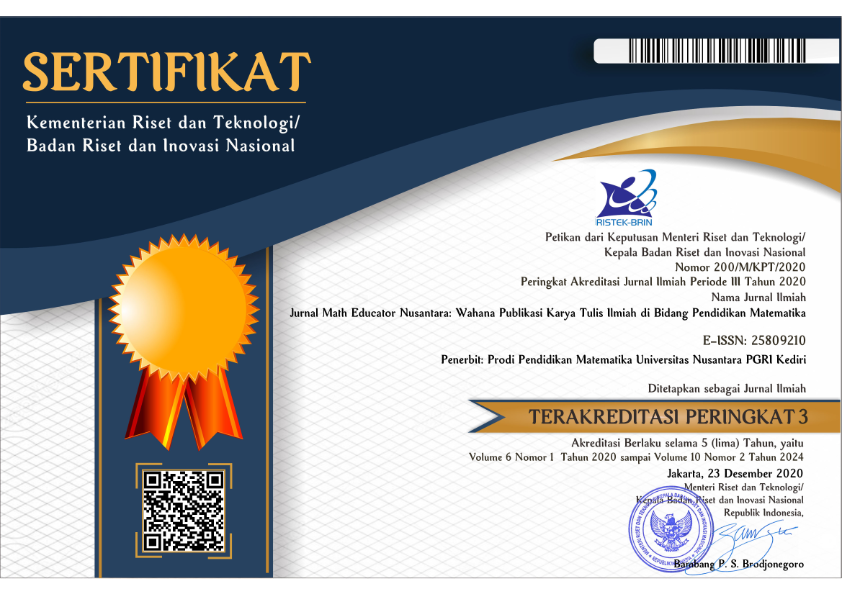Pedagogical compentence of mathematics education lectures using LMS (Learning Management System) moodle in the era Covid-19
DOI:
https://doi.org/10.29407/jmen.v7i1.15847Keywords:
pedagogical competence, Learning Management System, LMS MoodleAbstract
This study aimed to investigate to what extent the mathematics education lectures’ pedagogical competence using LMS Moodle in the era covid-19. The researchers employed a case study research design and the participants comprised three mathematics education lecturess who used LMS Moodle IKIP PGRI Bojonegoro. As well, to collect the data, observation, questionnaire, and fieldnotes were used based on the teacher's perspective. The responses were then to be interpreted into percentages and analysed descriptively. There were three main phases to analyse the data, namely data reduction, data display, and conclusion drawing and verification. Moreover, triangulation was applied to validate and verify the data collected. The results of this study indicated that the mathematics education lectures' pedagogical competence was good as a whole of the seventh aspects discussed.
References
Creswell, J.W. 2012. Research Design: Qualitative, Quantitative, And Mixed Method Approaches (4th Ed). Thousand Oaks, California: SAGE Publications.
Creswell, J.W. 2014. Research Design: Qualitative, Quantitative, And Mixed Method Approaches (4th Ed). Thousand Oaks, California: SAGE Publications.
Denzin, N. K., & Lincoln, Y. S. (Eds.). (2005). The Sage handbook of qualitative research (3.ed). Thousand Oaks, Calif: Sage.
Dewey, J. (1954). Experience and education. New York: Collier/Macmillan. (Original work published 1927).
Johnson, R.B., & Christensen, L. 2014. Educational research: quantitative, qualitative, and mixed approaches 5th Edition. United States of America: SAGE Publications, Inc.
Kihlgren, P. 2016. Do we need validity?: A critical appraisal of validity in qualitative research. Unpublished thesis. Lund University: Department of sociology, spring term 2016.
Mann, P.S. (1995). Introductory Statistics (2nd ed.). Wiley. ISBN 0-471-31009-3.
Oser, Fritz, Oelkers, J. (2001). The effectiveness of teacher education systems. From all-rounder education to the training of professional standards. Zürich: Rüegger Verlag.
Richards, J. (2002). 30 years of TEFL/TESL: A Personal Reflection. RELC Journal. 33(2):1-35. Sax (1980: 28).
Rusyan, A.T., Winarni, W., & Hermawan, A. 2020. Seri Pembaharuan Pendidikan Membangun Kelas Aktif Dan Inspiratif. Yogyakarta: Deepublish Publisher.
Spencer, L., Ritchie, J., Lewis, J., & Dillon, L. (2003). Quality in qualitative evaluation: a framework for assessing research evidence. Retrieved from http://dera.ioe.ac.uk/21069/2/a-quality-framework-tcm6-38740.pdf.
Suciu, A.I, & Mâţă, L. (2011). Pedagogical competences: The key to efficient education. International Online Journal of Educational Sciences, 2011, 3(2), 411-423.
Sukarman. (2003). Dasar-Dasar Didaktik dan Penerapannya dalam Pembelajaran. Jakarta: Depdiknas.
Downloads
Published
Issue
Section
License
Authors who publish with this journal agree to the following terms:
- Copyright on any article is retained by the author(s).
- The author grants the journal, the right of first publication with the work simultaneously licensed under a Creative Commons Attribution License that allows others to share the work with an acknowledgment of the work’s authorship and initial publication in this journal.
- Authors are able to enter into separate, additional contractual arrangements for the non-exclusive distribution of the journal’s published version of the work (e.g., post it to an institutional repository or publish it in a book), with an acknowledgment of its initial publication in this journal.
- Authors are permitted and encouraged to post their work online (e.g., in institutional repositories or on their website) prior to and during the submission process, as it can lead to productive exchanges, as well as earlier and greater citation of published work.
- The article and any associated published material is distributed under the Creative Commons Attribution-ShareAlike 4.0 International License














